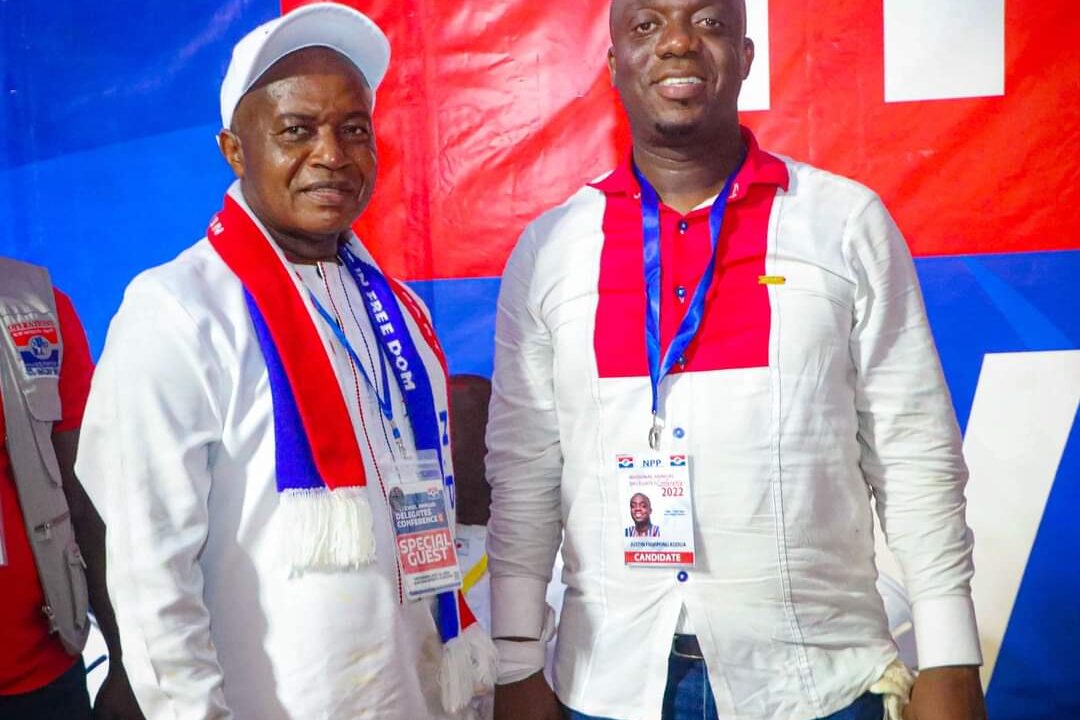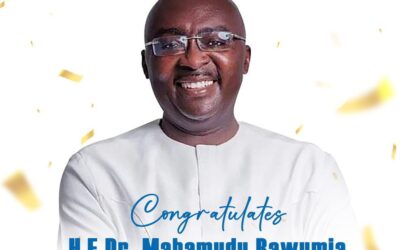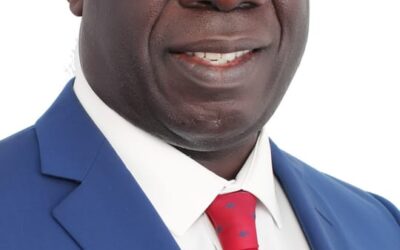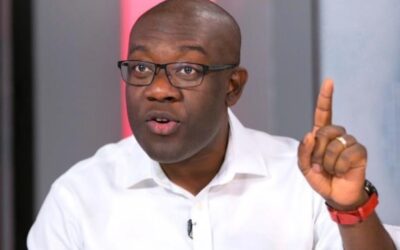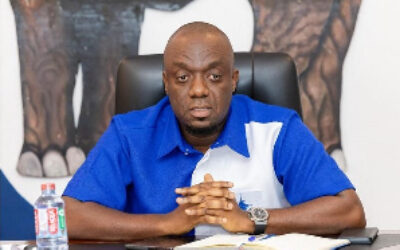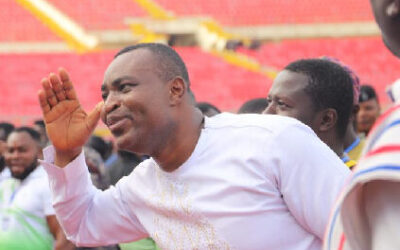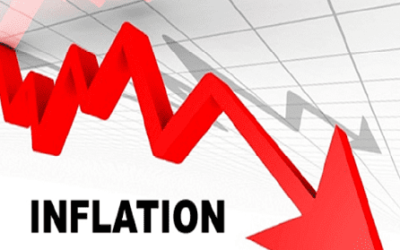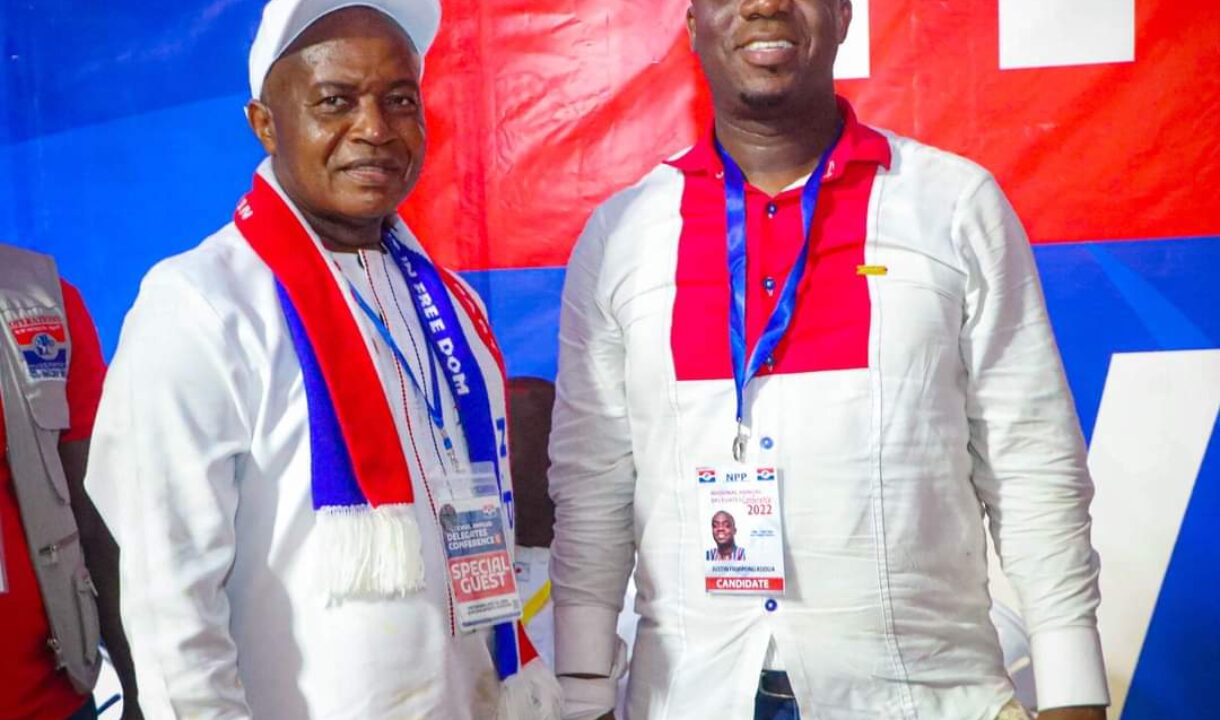STATEMENT ON THE THIRTIETH ANNIVERSARY OF THE NEW PATRIOTIC PARTY ON THE 28TH OF JULY, 2022
Fellow Ghanaians, friends from the media, dignitaries, ladies and gentlemen, we are grateful for honouring our invitation to be part of this special occasion to commemorate the thirtieth anniversary since the founding of the New Patriotic Party (NPP).
It is worth noting that the entity currently known as the New Patriotic Party was officially registered in Ghana as a liberal democratic party on July 28, 1992, but its antecedents can be traced to the UGCC which was the first political party in our country.


We, the current adherents are extremely proud of the tradition to which we lay claim and the role that the New Patriotic Party and its antecedents have played in making the rule of law, multi-party democracy, respect for individual liberties and the pursuit of a liberal economy the distinguishing factors of the political and economic landscape of Ghana.
Our founders had a clear vision of the Ghana they wanted and were quite clear in how to achieve that vision. When dictatorships and one-party States became the fashion around the African continent and President Nkrumah turned Ghana into a one-party state, it was left to Dr. JB Danquah to become the lead and often, only open dissenting voice against Nkrumah’s dictatorship and acrimonious purge of political opponents.
Dr Danquah was to die painfully in prison for merely advocating for multi-party democracy and the rule of law. Other leaders such as Baffour Oei Akoto and Obetsebi Lamptey, were imprisoned for long years, whilst others, like Professor KA Busia went into exile.
Today, it all sounds almost unbelievable to a generation of Ghanaians who have grown up in an era of Tilapia Cartoon and an atmosphere of multi-party democracy and freedom of speech. Today, there are Ghanaians who take the open abuse of a president of the republic as a normal and regular phenomenon. Today, demonstrations are things we take for granted, just as private radio stations and a free press. We in the NPP can say without any fear of contradiction that the Danquah-Busia-Dombo tradition made this state of affairs possible.

In 1969, our tradition finally had the opportunity to rule the country when, following the overthrow of Nkrumah’s government in 1966 and the decision by the National Liberation Council (NLC) to return Ghana to democratic rule, the Progress Party, led by Dr. Kofi Abrefa Busia, won the elections. The electoral victory of the Progress Party in 1969, offered Ghanaians a lot of hope as the party pursued polices to build a free democratic system of governance, improve the welfare of the masses, extend healthcare and decent housing to the people, and bridge the infrastructural gap between urban and rural areas.
Throughout its reign, the government of Prime Minister Busia never held a political prisoner as had been the norm under Nkrumah and the National Liberation Council.
And it was not for want of provocation as the CPP members, freed from being “gaping sycophants” took full advantage of the new atmosphere of freedom and relentlessly attacked Dr. Busia and his government.
Unfortunately, an administration that offered such promise did not have the opportunity to serve its term, but was overthrown by the military in January1972, just twenty-seven (27) months into its term.
When Ghanaians became disillusioned by socioeconomic conditions under the Acheampong regime and the proposed ‘Union Government’ referendum, it took members of the Danquah-Busia-Dombo tradition notably, Nana Addo Danquah Akufo-Addo, B.J. da Rocha and William Ofori-Atta to partner Komla Gbedema, Gen. Akwasi Afrifa and other members of various opposition groups to form the People’s Movement for Freedom and Justice (PFMJ) to demand Ghana’s return to democratic rule.
The opposition to the proposed Union Government and other factors, culminated in Acheampong’s overthrow and the conduct of general elections in 1979. Again, when Ghana needed fearless men to rise against the tyranny of dictatorship, the Danquah-Busia-Dombo tradition came to the rescue, further highlighting the NPP’s contribution to democratic development in Ghana.
Unfortunately, the tradition suffered a catastrophic case of internal disunity in the lead-up to the elections in 1979, when William Ofori Atta (Paa Willie) fell out with the PFP and contested on the ticket of the United National Convention (UNC). With a divided front, the tradition, split into the PFP and the UNC, were defeated by the PNP, which was the old CPP, now led by Dr Hilla Liman. Unfortunately, this third attempt at constitutional rule was also cut short by a coup d’etat on December 31, 1981 by the Provisional National Defence Council.
In opposing yet another military dictatorship, Prof. Albert Adu Boahen led the Movement for Freedom and Justice (MFJ) to resist Rawlings’ dictatorship and canvass for the restoration of the fundamental human rights of Ghanaians and the lifting of the ban on political activities.
Notable members of the MFJ included Johnny Hansen, Ray Kakraba Quarshie, Obeng Manu, Akoto Ampaw, Kwesi Pratt Jnr, Dan Lartey, John Ndebugre, A. Owusu Gyimah formed. Yet, again, members of the Danquah-Busia-Dombo tradition partnered others with opposing political orientation in demanding Ghana’s return to democratic rule.
Sustained pressure by the MFJ and other groups culminated in Ghana’s return to democratic rule. Subsequently, the New Patriotic Party was formed in July 28, 1992. The party’s formation would not have been possible without the contributions of Chief S.D. Dombo, R.R. Amponsah, Baffour Osei Akoto, Albert Adu Boahen, Victor Owusu, John Agyekum Kufuor, J.H. Mensah, Appenteng Appiah Menkah, Abaifa Karbo, Dr. Dzane Selby, Dr. Kwame Sarfo Adu, Jones Ofori Atta, C.K. Tedam, Rev. Dr. Samuel Asante Antwi, Nana Awuku, Prof. Ofosu Armah, J.A. Braimah, Richard Quashie, Prof. Yaw Twumasi, Prof. Adzei Bekoe, Haruna Isseku, Jato Kaleo, Sackey Scheck, Alhaji Shani Mahama, Stephen Kreku, Prof. John Fynn, B.K. Adama, Amponsah Dadzie, S.G. Antor, Kodzo Ayeke, Adam Amande, Mariama Yakubu Tali, Alhaji Yahaya Iddi, Madam Ama Busia, and several others. We also acknowledge the contributions of individuals whose names were submitted to the electoral commisiion for the registration of the party in 1992.
Notably, B.J. Da Rocha, Leader and Chairman of the party, Joseph Agenim Boateng, Secretary, Nana Akufo-Addo, National Organiser, Madam Theresa Amerley Tagoe, Women Organiser, Alhaji Malik Yakubu Alhassan, National Youth Organiser, Hackmann Owusu Agyemang, National Treasurer, and National Executive Members namely; Frank Abeizei Amissah, John Bosu Kwesi Spio, Henry Odartey Lamptey, Yaw Albert Osebre, Marlon Mark Stephen Yao Boateng, Dr. Thomas Kwame Aboagye, Kwadwo Owusu Sekyere, Amadu Kaleem, Adam Amandi and Abdulai Isaaku who acted as the party’s representatives for the ten regions and the founding members in all the regions.
Despite losing the 1992 general elections, the party’s leader, Prof. Albert Adu Boahen, authored the Stolen Verdict, a book that highlighted irregularities that characterised the elections and advocated for several reforms for the country’s young democracy. Subsequently, the party proposed several electoral reforms and pursued legal endeavours in institutionalising such reforms. We are proud to note that the introduction of transparent ballot boxes, voter identification cards, biometric verification devices amongst others, would not have been possible without the NPP’s persistent advocacy.
It was not until January 7, 2001 that the Danquah-Busia-Dombo tradition had its second opportunity at governance following the swearing in of John Agyekum Kufuor as President.
It was a trying time to assume office and some felt we had been served a poisoned chalice because of the very challenging economic conditions the country was in. The Kufuor administration took the brave but unpopular decision to subscribe to the IMF Highly Indebted Poor Country (HIPIC) programme.
Despite the gloomy economic conditions at the onset of his administration, the Kufuor government would perform what many have termed as a miraculous economic turn-around, by his second tenure in office. Notable among his achievements was the attainment of a lower middle-income status economy in 2007, introduction of the National Health Insurance Scheme, School Feeding Programme, Livelihood Empowerment Against Poverty (LEAP), National Youth Employment Programme, Metro Mass Transport System, Cocoa Mass Spraying, Repeal of Criminal Libel Law and Capitation Grant.
Internal tensions within our Party inflicted a painful loss on us in 2008 and it was to take until 2017 before we got another chance to govern. Again, like the Kufuor administration in 2001, we inherited very difficult economic conditions and showed our true mettle by not only overcoming the problems we met but taking on the most ambitious programme of economic and social interventions.
Before the onset of the Covid-19 pandemic, we were on the path to economic transformation. Growth rate increased from 3.7% in 2016, the lowest since 1992 to average 7% from 2017 to 2019. The rate of inflation also declined by 33% over the same period to 7.9%. Interest rate declined from 26% in 2015 to 16% in 2019.
The amount of total revenue used in servicing debts also dropped from 73% in 2018 to 58.9% by December 2019. In the midst of all that the government still funded its ambitious programmes such as the Free Senior High School initiative, the One District One Factory initiative and undertook an unprecedented building of roads and railway infrastructure. Let it not be forgotten that the Akufo-Addo administration was also compelled to save the deposits of 4.6 million Ghanaians with at least, 2.9 billion dollars as at January 2020 during the financial sector clean-up.
This was an avoidable mess that could have been avoided if the previous administration had been more proactive in its oversight responsibilities over financial institutions. We know and acknowledge that the country is in difficult times.
However, the NPP sees Ghana’s current challenges as yet another opportunity for the party and government to do what it does best and get the country out of the difficulties it is facing.
We aim to reduce inflation to post-pandemic levels, keep the national debt at sustainable levels, create jobs and fund public infrastructure projects, particularly roads and schools. As reiterated by the Finance Minister Ken Ofori Atta in the Mid-Year Budget Review, President Akufo-Addo is determined to revive the economy in the next two and half years.
We believe this can and will be done and therefore, admonish government appointees to put in extra efforts to aid the country’s economic renaissance. Further, we urge party communicators to be tolerant of criticisms and embrace dissenting opinions as the party seeks to win a third consecutive general elections (breaking the eight).
We appeal to all members, executives, loyalists and sympathisers of the NPP to be guided by history and what happens to us when we are not united
. When you feel like publicly taking on a fellow Party member, when you are undermining a fellow Party member, when you tell yourself you will not go out and campaign or even bother to vote, think of 1979 and the defeat of the Victor Owusu led Popular Front Party (PFP) during the 1979 elections, think of the pain of 2008 as the party prepares for its presidential and parliamentary primaries.
As national executives, we pledge to act as impartial referees in the upcoming presidential and parliamentary primaries and admonish all other executives to do same. Further, we admonish supporters of would be aspirants to refrain from the use of provocative language, character assassination and lampooning of rivals in the lead up to the party’s primaries. In this era of Social Media, it is important not to wash our dirty linen in public. After all, we remain the sons and daughters from the womb of one giant elephant.
As clearly demonstrated, the NPP, traced to the Danquah-Busia-Dombo tradition has a long history of enormous contributions to the rule of law, multi-party democracy, and socioeconomic development in Ghana. On the 30th anniversary of the party’s establishment, we are more than determined to harness the best faculties in the country in providing solutions to prevailing developmental challenges.
May God bless our homeland Ghana and make the NPP great and strong.
Kukrudu………Eshi
Kukrudu……Eshi
Kukrudu …… Eshi Rado, Rado…..


